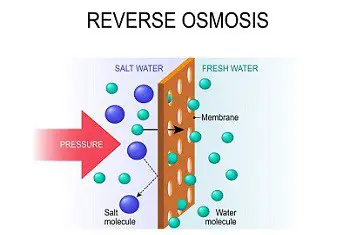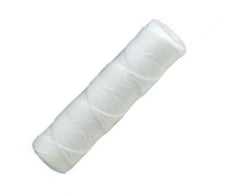You have a water softener, and your water comes out clear and tastes great!
But you know that you should be keeping an eye on your family’s salt intake. You add salt to your water softener regularly, but don’t want your family to drink salty water. There is a water filter next to your water softener, maybe that filter takes out salt from your water.
Can A Water Filter Remove Salt? A standard water filter is for removing sediment and other large particles from your water. The dissolved salt in the water will not get filtered out by a simple water filter. A reverse osmosis system uses a very fine filter called a membrane which will remove dissolved salt from your water.
Wanting to reduce the amount of salt in your water is a great idea. But just using a simple water filter won’t do the job. Because dissolved salt in water is much finer than a standard filter can stop, a much finer water filtering system will be needed.
How does salt get into your water?
Salt can get into the water in many different ways, but the primary source of salt in groundwater is when water in the ground makes contact with salt deposits in the earth.
As the water runs through a deposit of salt in the earth, it will dissolve some of the salt as it passes.

If the water is slow-moving or passes through many salt deposits, the level of salt in the water will be higher. And in areas where salt is used to clear snow and ice from the roads, this extra salt can cause salt levels in water to be excessively high.
Both private wells and municipal water supplies can have varying levels of salt in them. Municipal water suppliers will treat water for harmful organic material like bacteria that may be found in the water, but they will not normally do anything to reduce the amount of salt that is present in the water.
The responsibility of salt or other dissolved solids in the water is usually left to the homeowner, which is why they use a reverse osmosis drinking water system in the home has become very common.
Can salt be removed from my water?
Absolutely! If you are concerned about high levels of salt in your water, or if you find that your water has a high number of Total Dissolved Solids (TDS) in it, a reverse osmosis drinking water system is a simple and economical way to greatly reduce the number of Total Dissolved solids in your water.
A reverse osmosis system may sound complicated, but reverse osmosis is actually a very simple process involving a water filtering membrane that can remove dissolved solids like sodium from your water.

How reverse osmosis works is by forcing your water through a semi-permeable membrane that allows water molecules to pass through, but rejects unwanted impurities and dissolved solids.
Do any standard filters help to remove the salt?
There are claims by some manufacturers that their filters will remove salt from your water, and the technology used to make filters is improving all the time. But most water filters are for the removal or reduction of sediment or particles that are not dissolved in the water the way salt (sodium) is.

Zerowater water filtering pitcher will remove dissolved solids from your water for a short time, but if you have a high number of Total Dissolved Solids in your water, you could be changing the Zerowater filters very often.
Because a reverse osmosis system does not work like a standard filter, it is able to remove a very high percentage of the Total Dissolved Solids in your water, without having to change the filter every few weeks.
How does reverse osmosis filter out salt from water?
Unlike a traditional filter that traps and holds the material that is meant to be removed from the water, a reverse osmosis membrane rejects the dissolved solids in the water. They then continue to get rinsed over the surface of the membrane and then to a drain.
By rejecting the salt molecules rather than capturing them, the membrane will continue to remove salt and other dissolved solids in the water for a long period of time before needing to replace the reverse osmosis membrane.
A standard residential reverse osmosis system requires a minimum of 40 pounds per square inch of water pressure to force the water through the membrane and also rinse away the unwanted dissolved solids.
Without this minimum water pressure the system will still filter out a large number of dissolved solids from the water, but the lack of water pressure will allow less water through the semi-permeable membrane and more water rinsing to the drain.
Ideal water pressure of 60 pounds per square inch will provide the most efficient reverse osmosis water filtering with sufficient rinse water, and the maximum amount of quality filtered water.
By using a semi-permeable membrane, a reverse osmosis system will allow water to pass through and get stored for use, and rinse the majority of the salt (sodium) down the drain.
A reverse osmosis drinking water system also uses sediment filters and carbon-based filters to remove many other impurities from the water that can be present in both private well water and in municipal water supplies.
Check out this short video about how a reverse osmosis system works!
Is filtering salt from water expensive?
Not at all! You can get an under-sink reverse osmosis drinking water system for your home at a very reasonable initial cost, and the future costs of replacement filters are very minimal compared to purchasing bottled water.
In most cases, the most popular reverse osmosis systems will pay for themselves within just a few years, and the convenience of use and quality of the water is often better than the most popular brands of bottled water.
If you compare the cost per gallon of reverse osmosis water to the cost of a reverse osmosis system, you will find that having a reverse osmosis system wins hands down.


We have a new home on a 480 ft deep well. We’ve been here over a month. We notice salt in the tap water as well as in the reverse osmosis system . What do we need to replace?
Hello Michael and thank you for the question.
What brand water softener and reverse osmosis systems do you have?
Do you have a sediment pre-filter before your water softener?
Do you taste salty water all of the time, or just every few days?
Is the taste different from the tap and the reverse osmosis or are they both the same?
See
“Salty water from Kinetico water softener”
“Why is my water salty in the morning”
“Do I need to change my reverse osmosis membrane”
Paul